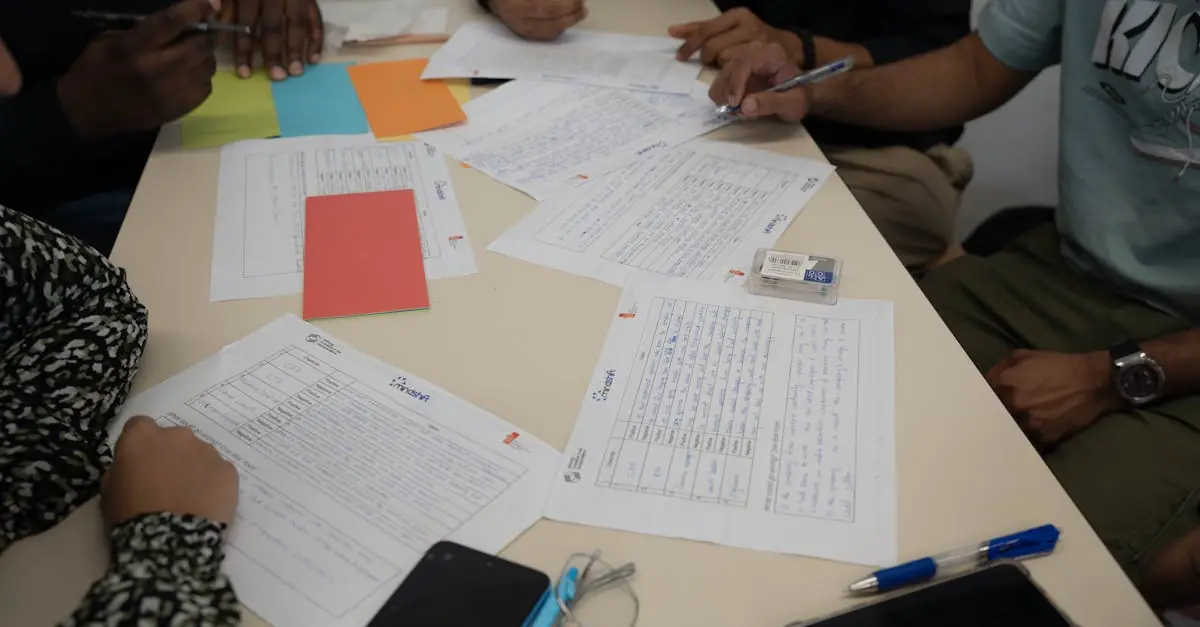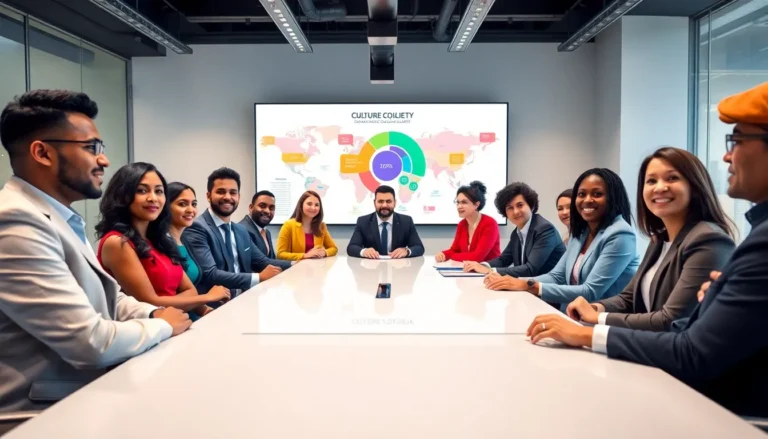In today’s fast-paced business world, having a solid B2B strategy isn’t just a luxury—it’s a necessity. Picture this: a room full of professionals, armed with coffee and a sprinkle of creativity, ready to transform their business approaches. That’s the magic of a B2B strategy workshop. It’s where the mundane turns into the extraordinary, and brainstorming sessions feel more like a lively debate over the best pizza toppings.
These workshops are more than just a chance to escape the office grind. They’re a golden opportunity to unlock innovative ideas, tackle challenges head-on, and forge powerful partnerships. With engaging activities and expert insights, participants walk away not just with strategies, but with a renewed sense of purpose. So, if you’re ready to elevate your business game and have a little fun while doing it, a B2B strategy workshop might just be your next big adventure.
Table of Contents
ToggleOverview of B2B Strategy Workshops
B2B strategy workshops serve as essential platforms for businesses aiming to refine their strategic approaches. Engaging sessions facilitate collaboration among professionals who share innovative ideas and insights. Participants gain clarity on their objectives, uncovering effective tactics to tackle industry challenges.
Collaboration among diverse teams promotes synergy, enhancing creativity in problem-solving. These workshops focus on real-world applications, ensuring strategies align with market demands. Experienced facilitators guide discussions, helping teams identify priorities and trends.
Structured activities stimulate participant engagement, making the process enjoyable and productive. Teams often leave workshops equipped with actionable plans tailored to their unique goals. As a result, attendees frequently form valuable connections, fostering long-term partnerships.
Workshops also create an environment where feedback and open dialogue thrive. Eliciting diverse perspectives adds depth to the strategic planning process. Equipped with newfound insights, businesses can pivot quickly to capitalize on emerging opportunities.
By investing time in a B2B strategy workshop, organizations position themselves to navigate the complexities of the marketplace. Enhanced collaboration often leads to innovative solutions, driving growth and improving competitive advantage. Businesses that prioritize these workshops frequently see substantial improvements in their overall performance.
Key Benefits of Attending
Attending a B2B strategy workshop offers numerous advantages for organizations seeking growth and innovation. Participants gain valuable insights that enhance their strategic approaches.
Enhanced Collaboration
Collaboration stands at the forefront of B2B strategy workshops. Different teams come together, sharing diverse perspectives that spark creativity. This collective effort fosters an environment where ideas can flourish. Professionals leverage each other’s strengths to tackle challenges collaboratively. Often, participants forge new connections that extend beyond the workshop. These relationships pave the way for long-term partnerships. Engaging discussions drive greater understanding among team members and help create cohesive strategies.
Improved Strategic Alignment
Strategic alignment emerges as a key benefit in these workshops. Participants clarify their objectives and ensure that everyone moves in the same direction. This unified vision empowers teams to focus on shared goals rather than individual agendas. Experienced facilitators guide the process, ensuring that strategic priorities align with market realities. Each session leads to actionable plans tailored to specific business needs. By concentrating on aligned strategies, organizations position themselves for success in a competitive landscape. Enhanced alignment ultimately translates into improved overall performance.
Workshop Structure and Format
Workshop structure plays a crucial role in ensuring effective outcomes during B2B strategy workshops. Each session incorporates specific elements for smooth execution and engagement.
Pre-Workshop Preparation
Preparation sets the stage for success. Participants clarify their objectives and gather relevant data ahead of time. This information collection includes market analysis, competitor insights, and participant roles. Creating an agenda helps keep discussions focused. Facilitators may conduct surveys to gather participant expectations and tailor content accordingly. Setting expectations beforehand encourages active involvement and enhances the overall workshop experience.
Interactive Session Elements
Interactive sessions drive engagement and creativity. Group activities, like brainstorming exercises and breakout discussions, stimulate participant interaction. Structured exercises support collaboration, allowing teams to share diverse perspectives. Utilizing tools such as whiteboards or digital collaboration platforms fosters real-time idea generation. Incorporating case studies helps connect theory to practice, enabling participants to apply insights directly. Experiential learning remains essential, as it encourages active participation and practical understanding.
Insights from Successful Workshops
Successful B2B strategy workshops yield various insights that enhance future sessions. Participants often highlight the value of collaborative brainstorming, which fosters innovation. Engaging diverse perspectives drives creativity, allowing teams to generate unique ideas.
Structured activities play a pivotal role, as they encourage everyone to contribute meaningfully. Experienced facilitators guide discussions, ensuring they remain focused and productive. Every session ultimately targets key objectives, which helps clarify participants’ goals.
Market analysis and competitor insights frequently emerge as vital components of pre-workshop preparation. These insights enable teams to address challenges effectively while identifying emerging trends. By sharing relevant data, participants create a common foundation for strategic discussions.
Case studies serve as practical tools that connect theories to real-world scenarios. These examples foster experiential learning, allowing participants to understand potential outcomes better. Teams leave workshops with actionable plans tailored to their unique goals.
Networking opportunities contribute to the overall success of these workshops, as participants forge beneficial relationships. Building long-term partnerships often leads to collaborative projects that drive innovation. Connections formed during sessions can enhance future engagements, paving the way for enhanced cooperation.
Incorporating interactive elements such as digital collaboration tools amplifies idea generation. Whiteboards and shared platforms promote real-time exchanges, making the creative process more dynamic. By leveraging technology, workshops can adapt to diverse team needs, ensuring an inclusive environment.
Successful B2B strategy workshops emphasize collaboration, structured engagement, and actionable insights. By focusing on these areas, organizations navigate complexities and position themselves for growth.
Common Challenges and Solutions
B2B strategy workshops face various challenges that can impact their effectiveness. One common issue is lack of clear objectives. When participants do not clearly understand the purpose, discussions become unfocused. To address this, establishing defined goals before the workshop ensures participants remain aligned throughout the session.
Another challenge involves diverse perspectives leading to potential conflicts. Participants might struggle to agree on strategies. Utilizing structured activities can help facilitate constructive conversations. Facilitators encourage respectful dialogue, allowing all voices to be heard and fostering collaborative solutions.
Time management often presents difficulties in workshops. Limited time can result in rushed discussions and incomplete plans. Setting a clear agenda helps prioritize topics and allocate sufficient time for each. This approach allows participants to delve into critical areas without feeling pressured.
Participants may also experience resistance to change. Organizations often have established practices that are hard to revise. Emphasizing the benefits of new strategies during the workshop can encourage openness to innovative ideas. Providing tangible examples of successful changes reinforces the value of adaptation.
Inadequate follow-up actions can hinder the implementation of ideas generated during the workshop. Teams might leave with actionable plans but struggle to execute them. To solve this, assigning responsibilities and establishing timelines promotes accountability. Regular check-ins help ensure progress and keep everyone motivated.
Lastly, technology challenges can disrupt the flow of sessions. Technical difficulties with presentation tools or collaboration platforms waste time and impede engagement. Ensuring all technology is tested and functional beforehand minimizes disruptions. Creating alternative plans enhances flexibility and keeps the workshop on track.
B2B strategy workshops are pivotal in shaping an organization’s approach to the ever-evolving marketplace. By fostering collaboration and innovation among diverse teams, these workshops unlock valuable insights and actionable plans. Participants leave not only with refined strategies but also with strengthened partnerships that can drive future success.
Addressing common challenges through structured activities and clear objectives ensures that these sessions remain focused and productive. The emphasis on preparation and engagement enhances the overall experience, making it a worthwhile investment for businesses aiming to thrive. Prioritizing these workshops can lead to significant improvements in performance and growth, empowering organizations to navigate complexities with confidence.








